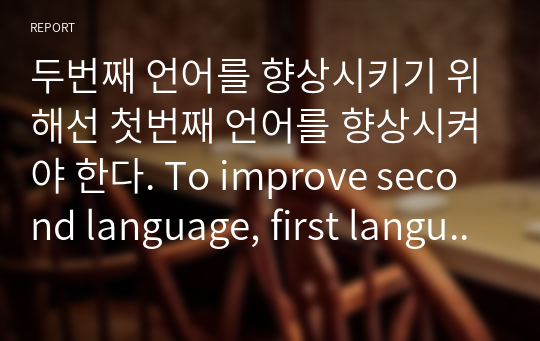두번째 언어를 향상시키기 위해선 첫번째 언어를 향상시켜야 한다. To improve second language, first language has to be reinforced. 영어레포트
레몬드랍
다운로드
장바구니
소개글
"두번째 언어를 향상시키기 위해선 첫번째 언어를 향상시켜야 한다. To improve second language, first language has to be reinforced. 영어레포트"에 대한 내용입니다.목차
I. Notion: To improve second language, first language has to be reinforced.1. Reading Comprehension
2. Writing
3. Speaking
II. My Change in Opinion
본문내용
Although language acquisition for different languages seems like separate matters developed in separate fields, they are actually in correlation with each other. According to Ellis (1985), first language is one of the determinants that affect second language, and the most critical. Aktan-Erciyes (2020) asserts that there are certain aspects of second language acquisition that should be supported by first language acquisition. Cummins (1979) points out that this is because the common underlying proficiency for foreign languages is learned through first language. Koda (2007) claims that this proficiency needs to be acquired only once by each individual. When they are developed enough, common underlying proficiency of the first language transfers to second language, assisting bilingual learners in terms of second language comprehension. Researchers such as Ortega (2008) and Cenoz et al. (2001)참고 자료
Aktan-Erciyes, A. (2020). Longitudinal effects of second language on first language narrative skills and executive functions of preschool children. Journal of Language and Linguistic Studies, 16(1), 42–58.Alshaboul, Y., Asassfeh, S., Alshboul, S., & Alodwan, T. (2014). The Contribution of L1 Phonemic Awareness into L2 Reading: The Case of Arab EFL Readers. International Education Studies, 7(3). https://doi.org/10.5539/ies.v7n3p99
Bhela, B. (1999). Native Language Interference in Learning a Second Language. International Education Journal, 1(1), 22-31.
Bouzer, S. (2019). Issues in Teaching Speaking to EFL Learners. Education and Linguistics Research, 5(1), 70. https://doi.org/10.5296/elr.v5i1.14705
Castilla, A. P., Restrepo, M. A., & Perez-Leroux, A. T. (2009). Individual differences and language interdependence: A study of sequential bilingual development in Spanish–English preschool children. International Journal of Bilingual Education and Bilingualism, 12(5), 565-580.
Cenoz, J., Hufeisen, B. & Jessner, U. (2001). Cross-linguistic Influence in Third Language Acquisition: Psycholinguistic Perspectives. Clevedon: Multilingual Matters.
Cook, V. (Ed.). (2003). Effects of the second language on the first. Clevedon: Multilingual Matters.
Cortés, N. C. (2005). Negative language transfer when learning Spanish as a foreign language. Interlingüística, 16, 237-248.
Cummins, J. (1979). Cognitive/academic language proficiency, linguistic interdependence, the optimum age question and some age matters. Working papers on bilingualism, 19, 121-129.
Cummins, J. (1979). Linguistic Interdependence and the Educational Development of Bilingual Children. Review of Educational Research, 49(2), 222–251. https://doi.org/10.3102/003465430490 02222
Dechert, H.W. (1983). How a story is done in a second language In C. Færch & G. Kasper (Eds.), Strategies in Interlanguage Communication. Longman, London: Longman Pub Group.
Dörnyei, Z. (1998). Motivation in second and foreign language learning. Language teaching, 31(3), 117-135.
Durgunoglu, A. Y., Nagy, W. E., & Hancin-Bhatt, B. J. (1993). Cross-Language Transfer of Phonological Awareness. Journal of Educational Psychology, 85, 453-465. http://dx.doi.org/10.1037/0022-0663.85.3.453
Edele, A., & Stanat, P. (2016). The role of first-language listening comprehension in second-language reading comprehension. Journal of Educational Psychology, 108(2), 163–180. https://doi.org/10.1037/edu0000060
Ellis, R. (1985). Understanding Second Language Acquisition. Oxford: Oxford University Press.
Ellis, R., & Widdowson, H. G. (1997). Second Language Acquisition (1st ed.). Oxford: Oxford University Press.
Gao, H. (2013). On Source Language Interference in Interpretation. Theory and Practice in Language Studies, 3(7). https://doi.org/10.4304/tpls.3.7.1194-1199
Genesee, F. (2006). Social factors in bilingual development : the Miami experience. In P. McCardle & E. (Eds.), Hoff Childhood Bilingualism: Research on Infancy Through School Age (Child Language and Child Development). Bristol, UK: Multilingual Matters Limited.
Hubert, M. D. (2015). Avoidance behavior in US university Spanish‐language instruction. International Journal of Applied Linguistics, 25(2), 139-159.
Jung, S. & Uhm, C. (2020). L2 읽기에서의 L1 읽기 이해력의 역할. 영어영문학21, 33(2), 135-157.
Koda, K. (2007). Reading and Language Learning: Crosslinguistic Constraints on Second Language Reading Development. Language Learning, 57, 1-44. http://dx.doi.org/10.1111/0023-8333.101997010-i1
Lanauze, M., & Snow, C.E. (1989). The relation between first- and second-language skills: Evidence from Puerto Rican elementary school children in bilingual programs. Linguistics and Education, 1, 323-340.
Łockiewicz, M., & Jaskulska, M. (2019). NL reading skills mediate the relationship between NL phonological processing skills and a foreign language (FL) reading skills in students with and without dyslexia: a case of a NL (Polish) and FL (English) with different degrees of orthographic consistency. Annals of Dyslexia, 69(2), 219–242. https://doi.org/10.1007/s11881-019-00181-x
Mehrabi, N. (2014). The Effect of Second Language Writing Ability on First Language Writing Ability. Theory and Practice in Language Studies, 4(8). https://doi.org/10.4304/tpls.4.8.1686-1691
Mohan, B. A., & Lo, W. A. Y. (1985). Academic Writing and Chinese Students: Transfer and Developmental Factors. TESOL Quarterly, 19(3), 515. https://doi.org/10.2307/3586276
Odlin, T. (1993). Language Transfer: Cross-Linguistic Influence in Language Learning. Cambridge University Press.
Ortega, M. (2008). Cross-linguistic influence in multilingual language acquisition: The role of L1 and non-native languages in English and Catalan oral production. Íkala, Revista de Lenguaje y Cultura, 13(19), 121-142.
Paradis, J. (2019). Proceedings of the 43rd Boston University Conference on Language Development. Somerville, MA: Cascadilla Press.
Skutnabb-Kangas, T. & Toukomaa, P. (1976). Teaching migrant children their mother tongue and learning the language of the host country in the context of the socio-cultural situation of the migrant family. Tampere, Finland: Tutkimuksia Research Reports, 1976.
Sparks, R. L., Patton, J., Ganschow, L., Humbach, N., & Javorsky, J. (2008). Early first-language reading and spelling skills predict later second-language reading and spelling skills. Journal of Educational Psychology, 100(1), 162–174. https://doi.org/10.1037/0022-0663.100.1.162
Ströbel, M., Kerz, E., & Wiechmann, D. (2020). The Relationship Between First and Second Language Writing: Investigating the Effects of First Language Complexity on Second Language Complexity in Advanced Stages of Learning. Language Learning, 70(3), 732–767. https://doi.org/10.1111/lang.12394
van Gelderen, A., Schoonen, R., Stoel, R. D., de Glopper, K., & Hulstijn, J. (2007). Development of adolescent reading comprehension in language 1 and language 2: A longitudinal analysis of constituent components. Journal of Educational Psychology, 99(3), 477–491. https://doi.org/10.1037/0022-0663.99.3.477
Wang, X. (2009). Exploring the negative transfer on English learning. Asian social science, 5(7), 137-143.
Zhang, S., Morris, M. W., Cheng, C. Y., & Yap, A. J. (2013). Heritage-culture images disrupt immigrants' second-language processing through triggering first-language interference. Proceedings of the National Academy of Sciences, 110(28), 11272–11277. https://doi.org/10.1073/pnas.1304435110


























